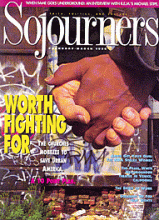A group of religious academics came together recently for a conference. During the opening session, an announcement was made that in Room A there would be a lecture about heaven, and in Room B there would be heaven. So all the academics got up quickly and headed to Room A for the lecture.
Maybe academics are easy targets. There seems to be no lack of cynicism directed toward the ivory towers of the university. The abstract professor is, of course, a kind of cartoon caricature. But lying behind the image is a common perception, "Bright folks, but can they say anything intelligible in the real world?"
Community activists hold suspicions that run much deeper. They share with academics a concern for such things as historical forces, technological change, social and economic relations, and value formation. That is about all they share. Rarely do they meet in a picket line, on a peace march, or at a tenants' meeting. Activists honestly wonder whether academics ever really get their hands dirty. What to them feels like a life-and-death struggle often seems little more than grist for the mill of stimulating discussion over at the university.
Certainly the activist/academic tension is more keenly felt today than in times past. Particularly in the 1960s the university was a hub for social movements. Some professors even were vilified by parents and government officials alike for "brainwashing" young minds. All the same, student activists often had little faith that their professors would be there when it really mattered; "never trust anyone over 30" ran the popular wisdom.
The "greed-lock" of the 1980s created an entirely different campus environment. Faculty members with an activist bent have been put under tremendous pressure to conform to institutional demands.
Read the Full Article
